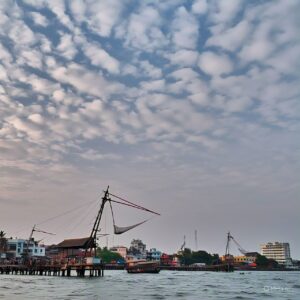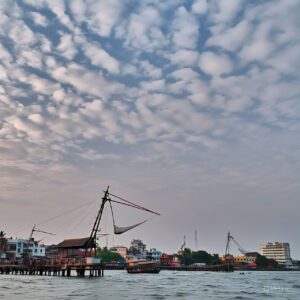The Role of Kochi’s Port in Boosting International Trade
Introduction
Kochi, located in the southern state of Kerala, is home to one of India’s most important ports. The Port of Kochi, also known as Cochin Port, plays a key role in boosting international trade and shipping. Thanks to its strategic location along the Arabian Sea and advanced infrastructure, the port connects India to global markets across Asia, Europe, and the Middle East.
Today, Kochi’s port is more than just a shipping dock. It is a major economic engine for Kerala and a critical player in India’s maritime trade.
1. Strategic Location of Kochi Port
The geographical location of Kochi gives it a natural advantage. Situated on the southwest coast of India, the port is close to major international sea routes that connect Asia to Europe and the Gulf countries.
This makes Kochi an ideal port for:
-
Transshipment cargo
-
Oil and gas imports
-
Container shipments
Many global shipping lines prefer to stop at Kochi due to its deep natural harbor, minimal tidal variation, and year-round operational status.
2. Infrastructure and Facilities at Kochi Port
Kochi’s port has world-class infrastructure that supports smooth and fast cargo handling. It includes:
-
Multiple wharves and berths
-
Deep-water channels
-
Container terminals
-
Warehousing and logistics support
One of the most important facilities is the International Container Transshipment Terminal (ICTT) at Vallarpadam, which is India’s first transshipment terminal. It has helped Kochi emerge as a strong logistics and cargo center in the region.
Key services include:
-
Container handling
-
Bulk cargo operations
-
Passenger cruise terminals
-
LNG (Liquefied Natural Gas) terminal
3. Boosting Kerala’s Economy
The port of Kochi plays a central role in boosting Kerala’s economy. It supports trade in key industries such as:
-
Spices
-
Tea and coffee
-
Seafood exports
-
Rubber and coir products
-
Machinery and electronics
Thousands of jobs are created directly and indirectly through port-related industries. Small businesses, exporters, shipping companies, and logistics firms all benefit from the smooth operation of the port.
4. Role in India’s International Trade
Kochi is one of the major ports in India contributing to foreign trade. It handles both imports and exports across a wide range of goods. From petroleum and crude oil to consumer electronics and agricultural products, Kochi acts as a gateway for trade.
In recent years, the port has seen steady growth in:
-
Container traffic
-
Ship arrivals
-
Tonnage handled
It supports India’s Make in India and Atmanirbhar Bharat missions by helping local manufacturers reach international markets easily.
5. Cochin Shipyard and Maritime Services
Kochi is also home to the Cochin Shipyard, one of India’s largest shipbuilding and maintenance facilities. This further strengthens Kochi’s position as a complete maritime services hub.
The shipyard builds and repairs:
-
Commercial vessels
-
Naval ships
-
Offshore support vessels
The shipyard supports international clients and is playing a major role in the blue economy.
6. Cruise Tourism and Passenger Movement
Kochi is not only a cargo port; it is also a key player in cruise tourism. Its international cruise terminal, known as Sagarika, welcomes tourists from around the world.
Cruise ships from Europe, the Gulf, and Southeast Asia often include Kochi in their route. This has boosted tourism and helped create opportunities for:
-
Local tour operators
-
Handicraft sellers
-
Travel agencies
-
Restaurants and hotels
This shows how the port supports both business and tourism growth.
7. Environmental Sustainability Measures
As global trade grows, sustainable port operations are important. Kochi port has taken steps to reduce its environmental impact. These include:
-
Using solar energy
-
Waste management practices
-
Pollution control measures
-
Shore power to reduce ship emissions
This commitment helps the port meet global environmental standards and supports eco-friendly shipping.
8. Connectivity and Logistics Network
The success of any port also depends on how well-connected it is to the rest of the country. Kochi port has strong road, rail, and air connectivity.
Key highlights:
-
NH-66 and NH-544 connect the port to major cities in Kerala and Tamil Nadu.
-
Dedicated rail cargo corridors move goods quickly.
-
Cochin International Airport nearby ensures air freight support.
This efficient multimodal transport system makes the port a key link in India’s logistics chain.
9. Challenges and Future Potential
Like any growing port, Kochi faces some challenges:
-
Limited hinterland connectivity to inner India
-
Need for faster customs clearance
-
Competition from nearby ports like Colombo and Mundra
However, the future looks promising. Ongoing government investments and projects like the Sagarmala initiative are expected to enhance port capacity and connectivity further.
Plans include:
-
Port expansion
-
Smart port technology adoption
-
Automation and AI-based logistics
-
Strengthening global trade partnerships
Conclusion
Kochi’s port is a vital part of India’s global trade ecosystem. With its modern infrastructure, strategic location, and wide-ranging services, it helps connect Indian businesses to the world. From handling cargo and containers to promoting tourism and sustainability, the port is a key player in driving economic growth and international trade.
As the world moves toward faster and greener shipping, Kochi is well-positioned to lead the way as a modern maritime hub in India.




 Kochi’s Strategic Location: The Gateway to the Arabian Sea
Kochi’s Strategic Location: The Gateway to the Arabian Sea Cochin Port Trust: The Engine of Maritime Trade
Cochin Port Trust: The Engine of Maritime Trade Vallarpadam ICTT: India’s First Transshipment Hub
Vallarpadam ICTT: India’s First Transshipment Hub Cochin Shipyard: Driving India’s Naval and Commercial Shipbuilding
Cochin Shipyard: Driving India’s Naval and Commercial Shipbuilding Southern Naval Command: Maritime Defense Headquarters
Southern Naval Command: Maritime Defense Headquarters Kochi’s Role in Blue Economy and Coastal Development
Kochi’s Role in Blue Economy and Coastal Development Infrastructure & Connectivity: Enabling Seamless Maritime Movement
Infrastructure & Connectivity: Enabling Seamless Maritime Movement Economic Impact: Jobs, Exports, and Growth
Economic Impact: Jobs, Exports, and Growth
 A City of Variety: Natural, Urban, and Historic Backdrops
A City of Variety: Natural, Urban, and Historic Backdrops Cost-Effective & Resource-Rich Filmmaking
Cost-Effective & Resource-Rich Filmmaking Kochi: A Live and Lively City
Kochi: A Live and Lively City Frequent Film Shoots and Industry Activity
Frequent Film Shoots and Industry Activity World-Class Accommodation & Support Services
World-Class Accommodation & Support Services Indoor Sets and Godown Space
Indoor Sets and Godown Space Natural Beauty and Green Spaces
Natural Beauty and Green Spaces Film Tourism: Kochi’s Emerging Identity
Film Tourism: Kochi’s Emerging Identity
 Kochi’s Expanding Tech Landscape: A Digital Powerhouse
Kochi’s Expanding Tech Landscape: A Digital Powerhouse Employment Generation: Fueling Job Growth in Kerala
Employment Generation: Fueling Job Growth in Kerala Sustainability & Inclusive Growth
Sustainability & Inclusive Growth Government Policy and Strategic Support
Government Policy and Strategic Support Kochi’s Future: A Digital-Industrial Powerhouse
Kochi’s Future: A Digital-Industrial Powerhouse